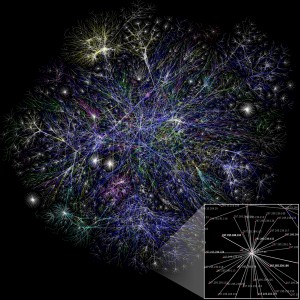AMALEA: Advances in Machine Learning

There are many real-world problems of such high complexity that traditional scientific approaches, based on physical and statistical modeling of the data generation mechanism, do not succeed in addressing them efficiently. The cause of inefficiencies often lies in multidimensionality, nonlinearities, chaotic phenomena and the presence of a plethora of degrees of freedom and unknown parameters in the mechanism that generates data. As a result, loss of information that is crucial to solve a problem is inherent in the data generation process itself, making a traditional mathematical solution intractable.
- Background and Goals
- Topics of Interests
- Chairs
- Program Committees
- Instructions of Authors
- Important Dates
- Paper Submission
- Contact Us
At the same time, however, biological systems have evolved to address similar problems in efficient ways. In nature, we observe abundant examples of high level intelligence arising via inter-networking components of only elementary intelligence:
Biological neural networks, i.e., networks of interconnected biological neurons in the nervous system of most multi-cellular animals, are capable of learning, memorizing and recognizing patterns in signals such as images, sounds, smells or odors.
Ants exhibit a collective, decentralized, and self-organized intelligence that allows them to discover the shortest route to food in very efficient ways.
Similar ideas are true with regards to immune systems, social networks, financial and business networks, or graphs.
Topics of interest for this special session include, but not limited to:
biological and artificial neural networks
biological and artificial immune networks
biological and artificial swarm intelligence
genetic/evolutionary computing
fuzzy and neuro-fuzzy systems
belief networks
ensemble classifiers
deep belief networks/ deep learning approaches
advances in statistical learning
Petri nets
graph methods
ontologies
Bayesian/statistical methods
optimization methods in knowledge engineering
Applications
Professor-Dr. George A. Tsihrintzis, University of Piraeus
Dr. Dionysios Sotiropoulos, Athens University of Economics and Business
TBA
You are kindly requested to address the following issues immediately,
as IEEE may be slow in responding to help requests.
Important Notice for Authors of Accepted Papers:
All Accepted Papers are required to pass IEEE PDF eXpress PDF Check by JULY 20, 2016 (Firm Deadline) in order to be included in the IEEE Xplore-compliant CD
–
Step by Step Instructions:
Access the IEEE PDF eXpress site at http://www.pdf-express.org (open June 23, 2016)
- First-time users: Click “New Users-Click Here”, enter 39952X for the Conference ID, your e-mail address and choose a new password. Continue to enter information as prompted. Check that the contact information is still valid and click Submit.
- Previous users, but using it the first time for a new conference: Enter 39952X for the Conference ID, your e-mail address and the password you used for your old account. When you click “Login”, you will receive a warning saying you need to set up an account. Simply click “Continue”. Enter your previously used e-mail address and password combination to enable your old account access the IISA2016 conference.
- Returning users: Enter 39952X for the Conference ID, e-mail address and password.
- For each conference paper, click “Create New Title”
- Enter identifying text for the paper (title is recommended but not required)
- Click “Submit PDF for Checking” or “Submit Source Files for Conversion”
- Indicate Platform, source file type (if applicable), click Browse and navigate to file, and click “Upload File”. You will receive online and e-mail confirmation of successful upload
- You will receive an e-mail with your Checked PDF or IEEE PDF eXpress-converted PDF attached. If you submitted a PDF for Checking, the email will show you if your file passed or failed.
–
AFTER you have successfully created the IEEE Xplore-compatible PDF file(s) you must re-upload the Final Camera-Ready file using Easychair Paper Submission System by JULY 20, 2016 (Firm Deadline)!
–
Troubleshooting:
If the PDF submitted failes the PDF check:
Option 1: Submit your source file for conversion by clicking Try again, then Submit Source Files for Conversion.
Option 2: Read the PDF Check report, then click “The PDF Check Report” in the sidebar to get information on possible solutions.
Option 3: “Request Technical Help” through your account or via email at: pdfsupport@ieee.org (include Conference id: 39952X).
If you are not satisfied with the IEEE PDF eXpress-converted PDF:
Option 1: Resubmit your source file with corrections Try again, then Submit Source Files for Conversion.
Option 2: Submit a PDF by clicking Try again, then Submit PDF for Checking
Option 3: “Request a Manual Conversion” through you account
General Conference Important Dates
Workshop | Special Session | Tutorial Proposals: February 29, 2016
Paper Submission: April 11, 2016 May 20, 2016
Author Notification: May 27, 2016
Camera-Ready: June 06, 2016
Paper Submission Process
Note! During paper submission, when you reach the SELECT A TRACK page, if you are submitting a paper to a Workshop or Special Session, you are kindly requested to select the appropriate WS (Workshop Session) or SS (Special Session) from those listed on the paper submission form. Otherwise, please select GS (General Sessions)!
To Submit, Edit or Review a Paper, please sign in using the link below
If you don’t have an Account please create one Here
If you are having any trouble with your account please click here
Professor-Dr. George A. Tsihrintzis, University of Piraeus, geoatsi@unipi.gr


